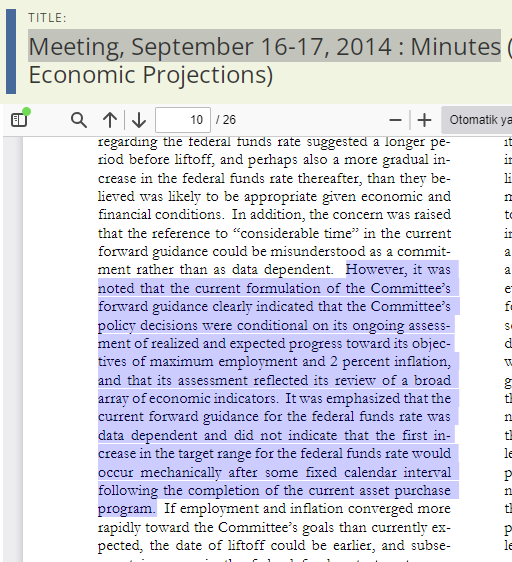Data-Dependent Monetary Policy : Data Dependent Approach or Data Driven Approach
Data-Dependent Monetary Policy : Data Dependent Approach or Data Driven Approach John C. Williams I often say I'm data-dependent Is the Fed data dependent?
Is the Fed data dependent ?
The president and chief executive officer of the Federal Reserve Bank of New York John C. Williams said, 'I often say I'm data-dependent.' 1 What does that mean? Meanwhile, if John C. Williams is sick and he needs any medical treatment, perhaps he's waiting for an econometric model from Dr. Walter Enders (Applied Econometric Time Series) to predict the perfect day for a check-up!

Powell (2019) emphatically2 introduced the concept of data-dependent monetary policy in the 61. Annual Meeting of the National Association for Business Economics.3 Powell (2019) defined this term as “data dependence is, and always has been, at the heart of policymaking at the Federal Reserve. We are always seeking out new and better sources of information and refining our analysis of that information to keep us abreast of conditions as our economy constantly reinvents itself. At the Fed, we like to say that monetary policy is data dependent. We say this to emphasize that policy is never on a preset course and will change as appropriate in response to incoming information”.
I'm trying to find out when this term was first used in Federal Reserve documents, so I started investigating by searching the FRASER database.4
This term firstly used/coined in 'September 16-17, 2014 Minutes'5 from Chair Yellen's term.
From this statement, we understand that the federal funds rate is data-dependent, and there is no fixed or mechanical schedule for decreasing or increasing the federal funds rate targets.
Data dependent means that there is no fixed or mechanical schedule for federal funds rate targets !
I continue to search the following minute : December 16-17, 2014 : Minutes6
In this minute, the term "data-dependent" is explained in more detail, indicating that this term relates to incoming information.
Data-dependent means that changes in the federal funds rate targets are more related to incoming information!
DaftPunk - ”One more time” !
I continue to search the following minute : Minutes of the Federal Open Market Committee. January 27-28, 20157
In this minute, the term "incoming information" is explained in more detail, indicating that this term relates to unanticipated economic developments.
Incoming information means the unanticipated economic developments in the economy!
We need to listen Chair Yellen at the "The New Normal Monetary Policy," a research conference.8
Yellen (2015) stated that the timing of the first increase in the federal funds rate and its subsequent path will be determined by the Committee in light of incoming data on labor market conditions, inflation, and other aspects of the current expansion. Keeping in mind the all-important proviso that policy is never predetermined but is always data dependent. Committee's decisions will be data dependent, reflecting evolving judgments concerning the implications of incoming information for the economic outlook.
I understand that the term 'incoming information' developed in this speech covers labor market, inflation, and growth data.
Incoming information covers the GDP growth, inflation, and employment.
Vice Chair of the Board of Governors of the Federal Reserve System Philip N. Jefferson delivered remarks at the Peterson Institute for International Economics. He focused on the three different incoming information.
The consumer spending could be even more resilient than I currently expect it to be, which could cause progress on inflation to stall. Second, employment could weaken as the factors supporting economic growth fade. Third, geopolitical risks could remain elevated, and a widening of the conflict in the Middle East could have greater effects on commodity prices, such as oil, and on global financial markets.9
Cecchetti(2023)10 explained the data dependent approach in different aspect.
Conclusion
In conclusion, the Federal Reserve's adoption of a data-dependent monetary policy signifies a dynamic approach to setting federal funds rate targets, closely aligning them with the flux of incoming information. This strategy emphasizes responsiveness to unanticipated economic developments, thereby allowing for a more agile monetary policy framework. By focusing on key economic indicators such as GDP growth, inflation, and employment, the Fed ensures that its policy adjustments are both informed and timely. This approach not only facilitates a more accurate response to the current economic environment but also underscores the Fed's commitment to stabilizing the economy while pursuing its goals of maximum employment and price stability.
Engin YILMAZ (
)Sources
It implies that Powell was clear and forceful in his communication about data-dependent monetary policy, ensuring that his message was understood with strong emphasis. This choice of word aims to maintain the original intent of highlighting the assertiveness in Powell's approach to discussing the policy.
Cecchetti (2023), The Fed: From forward guidance to data dependence








